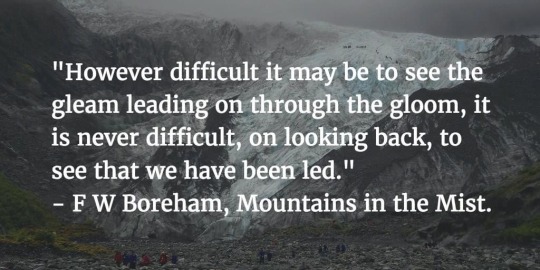Text
"When you are interiorly free you call others to freedom, whether you know it or not. Freedom attracts wherever it appears. A free man or a free woman creates a space where others feel safe and want to dwell. Our world is so full of conditions, demands, requirements, and obligations that we often wonder what is expected of us. But when we meet a truly free person, there are no expectations, only an invitation to reach into ourselves and discover there our own freedom. Where true inner freedom is, there is God. And where God is, there we want to be."
— Henri Nouwen
0 notes
Text
"Some people bring out the worst in you, others bring out the best, and then there are those remarkably rare, addictive ones who bring out the most. Of everything. They make you feel so alive that you’d follow them straight into hell…"
Karen Marie Moning
0 notes
Text
“The Buddha's Last Instruction" by Mary Oliver
"Make of yourself a light"
said the Buddha,
before he died.
I think of this every morning
as the east begins
to tear off its many clouds
of darkness, to send up the first
signal-a white fan
streaked with pink and violet,
even green.
An old man, he lay down
between two sala trees,
and he might have said anything,
knowing it was his final hour.
The light burns upward,
it thickens and settles over the fields.
Around him, the villagers gathered
and stretched forward to listen.
Even before the sun itself
hangs, disattached, in the blue air,
I am touched everywhere
by its ocean of yellow waves.
No doubt he thought of everything
that had happened in his difficult life.
And then I feel the sun itself
as it blazes over the hills,
like a million flowers on fire-
clearly I'm not needed,
yet I feel myself turning
into something of inexplicable value.
Slowly, beneath the branches,
he raised his head.
He looked into the faces of that frightened crowd.
0 notes
Text
"Nothing has transformed my life more than realizing that it’s a waste of time to evaluate my worthiness by weighing the reaction of the people in the stands"
- Brene Brown, Daring Greatly
2 notes
·
View notes
Text
The Philosophy of the Dog
The philosophy of the dog explores the nature of canine existence, their relationships with humans, and the philosophical insights that can be derived from observing and interacting with dogs. While dogs do not engage in philosophical inquiry in the human sense, their behavior, characteristics, and interactions with humans offer rich material for philosophical reflection. Here are some aspects of the philosophy of the dog:
Loyalty and Companionship: Dogs are known for their unwavering loyalty and deep bonds with humans. Philosophical discussions on loyalty may examine themes of trust, commitment, and the nature of interpersonal relationships.
Presence and Mindfulness: Dogs live in the present moment, fully engaged with their surroundings and experiences. Philosophical reflections on canine mindfulness may explore concepts of mindfulness, awareness, and the importance of living in the present.
Ethics and Morality: Dogs exhibit behaviors that humans often interpret as moral or ethical, such as empathy, cooperation, and altruism. Philosophical inquiries into canine ethics may consider questions of moral agency, empathy, and the foundations of moral behavior.
Innocence and Authenticity: Dogs are often regarded as symbols of innocence and authenticity, living without pretense or artifice. Philosophical explorations of canine innocence may touch upon themes of authenticity, sincerity, and the search for meaning in a complex world.
Freedom and Constraint: Dogs navigate the boundaries between freedom and constraint, experiencing both the joys of autonomy and the limitations of domestication. Philosophical reflections on canine freedom may consider the nature of freedom, responsibility, and the tension between individual autonomy and social constraints.
Instinct and Training: Dogs possess innate instincts shaped by their evolutionary history, as well as behaviors learned through training and socialization. Philosophical inquiries into canine behavior may explore questions of nature versus nurture, agency, and the role of education in shaping character.
Joy and Playfulness: Dogs exhibit exuberance, joy, and playfulness in their interactions with humans and other animals. Philosophical reflections on canine joy may consider the nature of happiness, spontaneity, and the pursuit of pleasure in life.
Suffering and Compassion: Dogs experience pain, suffering, and vulnerability, eliciting feelings of compassion and empathy in humans. Philosophical inquiries into canine suffering may examine questions of empathy, compassion, and the moral imperative to alleviate suffering in others.
Interconnectedness and Interdependence: Dogs and humans share a deep and interconnected relationship, shaped by millennia of coevolution and companionship. Philosophical reflections on canine-human relationships may explore themes of interdependence, interspecies communication, and the ethical dimensions of human-animal interactions.
In summary, the philosophy of the dog encompasses a wide range of contemplations on loyalty, presence, ethics, innocence, freedom, instinct, joy, suffering, interconnectedness, and more. Dogs serve as sources of inspiration and insight, inviting humans to reflect on fundamental questions about life, ethics, and the nature of existence.
3 notes
·
View notes
Text
Really Eternal City
by George Bilgere
After we’d walked for at least an hour,
heading toward the Vatican
on a broiling August day,
I began thinking about how long
the tour we’d signed up for was going to be,
and how many sacred things would be on view,
and how much complicated information
the guide would tell us about the ancient paintings
and Roman numerals and relics
and tombs and holy knuckle bones.
I knew it would all kind of just melt together
and congeal into one big lumpen mass
of guilt and suffering and miracles
and gloomy old men in sandals.
And as I was thinking this
we were passing through a shady little square
where a couple of bare-breasted marble nymphs
were playing in the fountain,
and there were no tour guides anywhere,
there was no suffering or crucifixions,
nor was there even one important name or date
I would have to try to remember.
And the cheap red wine at the sidewalk ristorante
where we ended up spending the afternoon
instead of going to the Vatican
was wonderful, even miraculous,
as was the spaghetti bolognese.
0 notes
Text
The Philosophy of Curiosity
The philosophy of curiosity explores the nature, origins, and implications of human curiosity, which drives individuals to seek knowledge, explore new experiences, and ask questions about the world around them. Curiosity has long been recognized as a fundamental aspect of human cognition and behavior, playing a central role in scientific inquiry, philosophical reflection, and everyday life. Here are some key aspects and theories within the philosophy of curiosity:
Epistemic Curiosity: Epistemic curiosity refers to the desire for knowledge and understanding, motivating individuals to seek information, explore new ideas, and engage in intellectual pursuits. Philosophers have debated the nature of epistemic curiosity, its origins in human cognition, and its role in shaping scientific progress and cultural development.
Aesthetic Curiosity: Aesthetic curiosity pertains to the exploration of beauty, art, and creativity, driving individuals to seek out new experiences, appreciate diverse forms of expression, and engage with works of literature, music, visual art, and other cultural artifacts. Aesthetic curiosity raises questions about the nature of artistic inspiration, cultural interpretation, and subjective experience.
Existential Curiosity: Existential curiosity concerns the exploration of existential questions about the nature of existence, meaning, and purpose, motivating individuals to reflect on their own lives, values, and beliefs. Existential curiosity encompasses inquiries into topics such as the nature of consciousness, the search for transcendence, and the quest for personal fulfillment.
Philosophical Curiosity: Philosophical curiosity involves the pursuit of philosophical inquiry, critical thinking, and self-reflection, prompting individuals to question assumptions, challenge conventional wisdom, and explore fundamental concepts such as truth, morality, justice, and reality. Philosophical curiosity underlies the practice of philosophy as a discipline and informs broader intellectual endeavors.
Ethical Curiosity: Ethical curiosity concerns the exploration of ethical questions and moral dilemmas, motivating individuals to consider the consequences of their actions, empathize with others, and strive for moral growth and development. Ethical curiosity raises questions about the nature of moral values, ethical principles, and the pursuit of the good life.
Cognitive Curiosity: Cognitive curiosity encompasses the exploration of cognitive processes, mental states, and psychological phenomena, driving individuals to understand how the mind works, how knowledge is acquired, and how beliefs are formed. Cognitive curiosity informs research in fields such as psychology, neuroscience, and cognitive science.
Cultural Curiosity: Cultural curiosity involves the exploration of diverse cultures, traditions, and worldviews, prompting individuals to learn about different societies, languages, and customs, and to appreciate the richness of human diversity. Cultural curiosity fosters intercultural understanding, global awareness, and cross-cultural communication.
Metacognitive Curiosity: Metacognitive curiosity pertains to the exploration of one's own cognitive processes and learning strategies, motivating individuals to reflect on their own thinking, monitor their own understanding, and adapt their learning strategies to achieve greater intellectual growth and self-improvement.
Overall, the philosophy of curiosity explores the multifaceted nature of human curiosity and its profound influence on knowledge, creativity, personal growth, and the human condition.
57 notes
·
View notes
Text
Precisely here,
where all lose faith in God,
where all despair about the power of God,
God is fully there,
and Christ is alive and near.
- Dietrich Bonhoeffer
1 note
·
View note
Text
You know there’s plenty of so-called Christianity in this world that is pathetically fashionable, superficially showy, and boringly trite. It turns my stomach as well as it turns yours. And I don’t mind it the least if you tell me how much it turns yours.
But the existence of a thousand fakes does not mean there is no such thing as a genuine diamond.
- ascribed to anonymity
Artist: Nikolaj Ge (1831-1894) - Christ in the Garden of Gethsemane, 1869

0 notes
Text
“What embitters the world is not excess of criticism, but an absence of self-criticism.”
⏤ G.K. Chesterton, “On Bright Old Things and Other Things” in Sidelights on New London and Newer New York
0 notes
Text
To improvise, first let your fingers stray across the keys like travelers in the snow: each time you start, expect to lose your way.
- Jared Carter
0 notes
Text
“There is no penalty to virtue; no penalty to wisdom; they are proper additions of being. In a virtuous action, I properly am; in a virtuous act, I add to the world; I plant into deserts conquered from Chaos and Nothing, and see the darkness receding on the limits of the horizon. There can be no excess to love; none to knowledge; none to beauty, when these attributes are considered in the purest sense. The soul refuses limits, and always affirms an Optimism, never a Pessimism.” — Ralph Waldo Emerson, Essays: First Series
1 note
·
View note
Text
youtube
3 notes
·
View notes
Text
When the superficial wearies me, it wearies me so much that I need an abyss in order to rest.
- Antonio Porchia
0 notes

